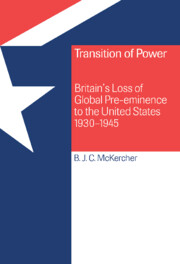Book contents
- Frontmatter
- Contents
- Acknowledgments
- List of abbreviations
- Prologue: Power and purpose in Anglo-American relations, 1919–1929
- 1 The end of Anglo-American naval rivalry, 1929–1930
- 2 The undermining of war debts and reparations, 1929–1932
- 3 Disarmament and security in Europe and the Far East, 1930–1932
- 4 The unravelling of co-operation, 1932–1933
- 5 Moving away from the United States, 1933–1934
- 6 Britain, the United States, and the global balance of power, 1934–1935
- 7 From Abyssinia to Brussels via London, Madrid, and Peking, 1935–1937
- 8 Appeasement, deterrence, and Anglo-American relations, 1938–1939
- 9 Belligerent Britain and the neutral United States, 1939–1941
- Epilogue: ‘A new order of things’, 1941–1945
- Select Bibliography
- Index
9 - Belligerent Britain and the neutral United States, 1939–1941
Published online by Cambridge University Press: 15 July 2009
- Frontmatter
- Contents
- Acknowledgments
- List of abbreviations
- Prologue: Power and purpose in Anglo-American relations, 1919–1929
- 1 The end of Anglo-American naval rivalry, 1929–1930
- 2 The undermining of war debts and reparations, 1929–1932
- 3 Disarmament and security in Europe and the Far East, 1930–1932
- 4 The unravelling of co-operation, 1932–1933
- 5 Moving away from the United States, 1933–1934
- 6 Britain, the United States, and the global balance of power, 1934–1935
- 7 From Abyssinia to Brussels via London, Madrid, and Peking, 1935–1937
- 8 Appeasement, deterrence, and Anglo-American relations, 1938–1939
- 9 Belligerent Britain and the neutral United States, 1939–1941
- Epilogue: ‘A new order of things’, 1941–1945
- Select Bibliography
- Index
Summary
We are entering upon a sombre phase of what must evidently be a protracted and broadening war, and I look forward to being able to interchange my thoughts with you in all that confidence and good will which has grown up between us since I went to the Admiralty at the outbreak.
Churchill, November 1940The outbreak of European war forced Chamberlain to restructure his government. With appeasement in ruins and deterrence a failure, the political temper of both his party and Parliament compelled him to bring the two chief critics of his foreign policy into a newly created War Cabinet. On 3 September, Churchill was appointed first lord of the Admiralty and Eden became dominions secretary. Because Churchill had consistently and publicly criticised British diplomatic strategy since before Munich – suggesting to general British opinion that he grasped better the international situation than Chamberlain – Churchill could probably have declined to join Chamberlain and formed his own ministry as his friend, Alfred Duff Cooper, confided to his diary: ‘Was it better to split the country at such a moment or bolster up Chamberlain?’ Clearly, Churchill thought it necessary to maintain national unity. He accepted Chamberlain's leadership and threw himself into his duties with a gusto suggesting that the restructured National Government had been infused with badly needed vitality.
Apart from revitalising the government and unifying the direction of war policy, Churchill and Eden's readmission to Britain's foreign-policy-making elite proved vital to the Anglo-American relationship.
- Type
- Chapter
- Information
- Transition of PowerBritain's Loss of Global Pre-eminence to the United States, 1930–1945, pp. 278 - 307Publisher: Cambridge University PressPrint publication year: 1999



